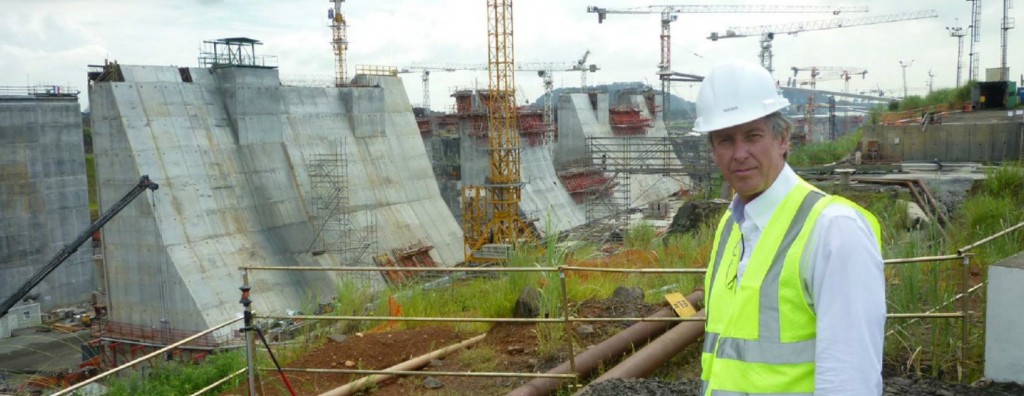Page 35 • (3,512 results in 0.031 seconds)
-
encounters with a variety of creation narratives, literature, film, and visual art from native peoples of the Americas, students examine changing relationships with the land, the cosmos, and other living beings. (4) NAIS 244 : Environmental Justice and Indigenous People - ES, GE This course examines the struggle against environmental destruction as fundamental to Indigenous experiences, tracing its history as a central feature of settler colonialism in the United States and globally. It focuses on
-

Lute’s Company Leads the Way on New Panama Canal Project Posted by: Sandy Dunham / April 10, 2015 Image: Alan Krause ’76 stands in front of the construction site at the Panama Canal expansion. (Photo courtesy of MWH Global) April 10, 2015 MWH Global Featured in History Channel Show April 11By Matthew Salzano '18PLU Marketing & CommunicationsTACOMA, Wash. (April 10, 2015)—Fun fact: The Panama Canal opened 101 years ago. Another? The canal is about to expand to double its capacity. The most fun
-
: Colonization and Genocide in Native North America HIST 335: Slavery, Pirates, and Dictatorship: History of the Caribbean NAIS 244: Environmental Justice and Indigenous Peoples RELI 245: Global Christian Theologies *Courses that are not listed here but which meet the content descriptions of the respective concentrations may be considered via petition to the Global Studies Program. Contact Department Chair, Dr. Ami Shah – shahav@plu.edu
-
Microplastic Debris in Puget Sound and Neighboring Waters” – Regency Room, UC Speaker: Julie Masura, faculty and research scientist, environmental science, Center for Urban Water, University of Washington Tacoma 1B) “Science on the Sea: Get Your feet Wet and ‘Discover by Doing'” – Room 201, UC Speakers: Jan Adams, Foss Waterway Seaport Museum; Madhuri Hosford, Foss Waterway Seaport Museum; Bonnie Beaudoin, Foss Waterway Seaport Museum 1C) “Oaxaca: Water and Sanitation: Challenges and Opportunities” – Room
-
environment and the intercultural study of religion, the course equips students to more thoughtfully and critically analyze ideas and traditions in religious and indigenous communities and in the environmental movement. Centering democratic education, the class asks students to research, reflect, and practice communicating on current environmental concerns. (4) RELI 240 : African American Religious Traditions - RL, VW, GE Introduction to the history and diversity of African American and/or Afro-Caribbean
-
Please note the time of year listed for each lecture is only an estimate. You should confirm the month/date with the department/division putting on the lecture. DEPARTMENT/NAME:GOAL/OBJECTIVE:TIME OF YEAR: Business and Economics: The Annual Dale E. Benson Lecture in Business and Economic HistoryBrings leading experts in the fields of history, business, and economics to campus to encourage historical reflection, creative problem solving, and ethical leadership through the exploration of business
-
Each year, Prism reflects on some of the distinctive and exciting work in PLU’s Division of Humanities. Our division collects a diverse array of programs: Chinese, Classics, Creative Writing, English Literature, French, German, Hispanic Studies, Nordic Studies, Philosophy, Religion, and Southern Lushootseed. All are united in educating students to engage —creatively, critically, and empathetically— with what it means to be human across the sweep of history, in diversity cultures and
-

philosophical essay. Princeton University Press. (PLU Library link) Environmental justice Deerinwater, Jen. (2022). Colonial forces of environmental violence on deaf, disabled, & ill indigenous people. Disability Studies Quarterly, 41(4). https://doi.org/10.18061/dsq.v41i4.8479 Gilio-Whitaker, Dina. (2019). As long as grass grows: The indigenous fight for environmental justice, from colonization to Standing Rock. Beacon Press. (PLU Library link) Glave, Dianne D. (2010). Rooted in the earth: Reclaiming the
-
has small class sizes, dedicated and caring faculty, great facilities, and an excellent curriculum. Earth Science Earth Science is a multidisciplinary field that studies the features, processes and history of the earth. Engineering Dual Degree Program This program provides students with the opportunity to combine a PLU liberal arts education with rigorous study in engineering. Students who complete the program earn two degrees — one from PLU and the other from an ABET-accredited engineering school
-
social distancing, face covering, and on-campus surveillance testing. Our faculty (in Civil & Environmental Engineering, Chemical & Biomolecular Engineering, Earth & Atmospheric Sciences, Chemistry & Biochemistry, and Biological Sciences) form a core group with a strong history of working together on joint research grants in this area, with the skills required to guide undergraduates in basic and applied research on multiple phases of chemical signaling processes. APPLY The Online Application
Do you have any feedback for us? If so, feel free to use our Feedback Form.


